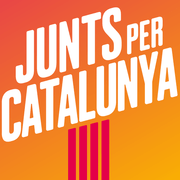Junts per Catalunya
Junts per Catalunya (English: "Together for Catalonia", JxCat, also JuntsxCat) is a political party in Catalonia centred around former President of the Generalitat of Catalonia Carles Puigdemont. It was formed as an electoral alliance of the Catalan European Democratic Party (PDeCAT), successor of the now defunct Democratic Convergence of Catalonia, and independents to contest the 2017 Catalan regional election.[6][7]
Junts per Catalunya | |
|---|---|
 | |
| Abbreviation | JxCat |
| Leader | Carles Puigdemont |
| Founded | 13 November 2017 (alliance) 11 July 2018 (party) |
| Merger of | PDeCAT/CDC[lower-alpha 1] CNxR |
| Ideology | Liberalism[3] Catalan nationalism[4] Catalan independence |
| Political position | Centre-right |
| Colors | Pink |
| European Parliament | 3 / 59 |
| Congress of Deputies (Catalan seats) | 8 / 47 |
| Spanish senate (Catalan seats) | 5 / 23 |
| Parliament of Catalonia | 34 / 135 |
| Mayors (2019-2023)[5] | 369 / 947 |
| Local government (2019-2023) | 2,799 / 9,077 |
| Website | |
| juntspercatalunya | |
The PDeCAT would provide the core of the platform, but it was to be structured as Puigdemont's personal list composed of figures from the civil society instead of a party list.[8][9][10] This came upon Puigdemont's rejection to lead a PDeCAT-only list into the 21 December election, instead favouring a "country list" after both Republican Left of Catalonia (ERC) and the Popular Unity Candidacy (CUP) rejected a new Junts pel Sí coalition.[11]
In July 2018 the platform was registered as a political party in the Interior Ministry register.[12]
The party was reformatted into an electoral alliance under the Junts per Catalunya–Junts label (English: "Together for Catalonia–Together") ahead of the April and November 2019 Spanish general elections.[13][14][15]
Composition
| Party | |
|---|---|
| Catalan European Democratic Party (PDeCAT) | |
| Democratic Convergence of Catalonia (CDC)[lower-alpha 1] | |
| National Call for the Republic (CNxR) (2019–present) | |
History
Junts per Catalunya is an electoral alliance brand registered by the Democratic Convergence of Catalonia and the Catalan European Democratic Party,[16] also including independents, for the Catalan Parliament elections of 2017. Following the declaration of Catalan independence by the Parliament of Catalonia and the subsequent activation of Article 155 of the Spanish Constitution, Mariano Rajoy called regional elections to the Parliament.[17] Puigdemont was in exile in Belgium and several ministers of the Executive Council of Catalonia were in pre-trial detention accused of sedition and rebellion. In this context, several Democratic Party leaders- Artur Mas, Marta Pascal and David Bonvehí[18]- met with Puigdemont in Brussels, where he finally became a candidate, on the condition that the list overcome nationalist symbolism and include independents.[17] Initially, Puigdemont had proposed putting himself forward as the head of a list of a grouping of electors.
The name was not new; it had been proposed at the founding congress of the Democratic Party, although it had been discarded in voting by the party's bases. The system was finally approved in the instance of the party's national council held on 15 November 2017.[17]
The creation of the group, its consolidation and parliamentary success, as well as the involvement of people with new ideologies, led to a fall in support for the PDeCAT and a rift between the main political leaders and ex-leaders of PDeCAT and Junts per Catalunya.
Candidates
The list was put forward by Puigdemont from Brussels and featured party members and different independents, including philologist Laura Borràs, historian Aurora Madaula, writer Jaume Cabré, sociologist Salvador Cardús, artist Pilarin Bayés, actor Joan Lluís Bozzo, chef Fermí Puig, historian Josep Maria Solé i Sabaté, and former national synchronised swimmer Anna Tarrés.[19]
An important figure was ANC president Jordi Sànchez, second on the list for Barcelona, after having refused such a post.[20] In total, five members of the ANC national secretariat left their positions to join the group's lists (Francesca Ferreres, Alícia Casals, Assumpció Castellví and Pere Grau).[21]
Electoral campaign
Elsa Artadi was the campaign manager and Eduard Pujol the spokesperson. The team also included Jaume Clotet, the Govern's communications director, mayor of Valls Albert Batet, Puigdemont's chief of staff Josep Rius and publicist Ramon Piqué.[22]
Results
Against all odds, Junts per Catalunya obtained 34 deputies (polls initially gave them 13, and before the elections, 25-27), a surprising result which put the party ahead of ERC (32 deputies) and the CUP (4 deputies). The three independentist groups had a total of 70 deputies, two above an absolute majority.[23][24] The list surpassed ERC by 12,000 votes and two seats, thus becoming the largest independentist party in the Parliament.[25]
The party won 2 fewer seats than Ciudadanos.
Electoral performance
Parliament of Catalonia
| Parliament of Catalonia | |||||||
| Election | Vote | % | Score | Seats | +/– | Leader | Status |
|---|---|---|---|---|---|---|---|
| 2017 | 948,233 | 21.66% | 2nd | 34 / 135 |
Carles Puigdemont | Government | |
Cortes Generales
| Cortes Generales | ||||||||
| Election | Congress | Senate | Status | |||||
|---|---|---|---|---|---|---|---|---|
| Vote | % | Score | Seats | +/– | Seats | +/– | ||
| 2019 (Apr) | 500,787 | 1.91% | 7th | 7 / 350 |
2 / 208 |
Opposition | ||
| 2019 (Nov) | 527,375 | 2.19% | 8th | 8 / 350 |
3 / 208 |
Opposition | ||
| Election | Catalonia | ||||||
|---|---|---|---|---|---|---|---|
| Congress | Senate | ||||||
| Vote | % | Score | Seats | +/– | Seats | +/– | |
| 2019 (Apr) | 500,787 | 12.08% | 4th | 7 / 48 |
2 / 16 |
||
| 2019 (Nov) | 527,375 | 13.68% | 4th | 8 / 48 |
3 / 16 |
||
European Parliament
| European Parliament | |||||
| Election | Vote | % | Score | Seats | +/– |
|---|---|---|---|---|---|
| 2019 | 1,018,435 | 4.54% | 7th | 2 / 54 |
|
Symbols
Notes
References
- "C3. Coalición electoral "Junts per Catalunya"". Junta Electoral Central.
- Lamelas, Marcos (24 November 2017). "El PDeCAT va el 21-D en coalición consigo mismo para cobrar las subvenciones de CDC". El Confidencial (in Spanish).
- Nordsieck, Wolfram (2017). "Catalonia/Spain". Parties and Elections in Europe. Retrieved 3 October 2018.
- "Puigdemont to head 'Together for Catalonia'". Catalan News. 13 November 2017.
- Los pactos certifican el auge de ERC y PSC y la caída neoconvergente. El País, 16/06/2019.
- "Junts per Catalunya, la llista del PDECat que liderarà Puigdemont". VilaWeb (in Catalan). 13 November 2017. Retrieved 13 November 2017.
- "Puigdemont encabezará una lista el 21-D bajo el nombre de 'Junts per Catalunya'". El Mundo (in Spanish). 13 November 2017. Retrieved 13 November 2017.
- "Junts per Catalunya, la marca con la que Puigdemont quiere plantar cara a ERC". El Confidencial (in Spanish). 12 November 2017. Retrieved 13 November 2017.
- "La lista de Puigdemont será Junts per Catalunya". La Vanguardia (in Spanish). 13 November 2017. Retrieved 13 November 2017.
- "La lista de Puigdemont se llamará Junts per Catalunya". El Periódico de Catalunya (in Spanish). 13 November 2017. Retrieved 13 November 2017.
- "Puigdemont ofrece a Rovira la 'lista país' y renuncia a las siglas "corruptas" de PDeCAT". El Confidencial (in Spanish). 12 November 2017. Retrieved 13 November 2017.
- "Registro de Partidos Políticos". servicio.mir.es (in Spanish). Ministry of the Interior. Archived from the original on 30 September 2017. Retrieved 15 March 2019.
- "La Crida avala que Jordi Sànchez se presente con Junts Per Catalunya en las elecciones generales". El Mundo (in Spanish). 9 March 2019. Retrieved 10 March 2019.
- "Sànchez lidera la lista de JxCat por Barcelona al Congreso con Borràs, Nogueras y Tremosa". Europa Press (in Spanish). 10 March 2019. Retrieved 10 March 2019.
- "Se presentan nueve coaliciones ante la Junta Electoral Central para concurrir a las generales del 28 de abril". RTVE (in Spanish). 16 March 2019. Retrieved 17 March 2019.
- "Constitution of Electoral Coalition" (PDF). Spanish Office of Patents and Brands.
- NacióDigital. "Junts per Catalunya: la marca que liderarà Puigdemont a les eleccions del 21-D | NacióDigital". www.naciodigital.cat (in Catalan). Retrieved 2019-06-25.
- "El Consell Nacional del PDECat avala que Puigdemont ultimi la llista de Junts per Catalunya". VilaWeb (in Catalan). Retrieved 2019-06-25.
- "Els independents de JxCat: Cabré, Cardús, Pilarín Bayés, Bozzo, Anna Tarrés, Oliveras..." ElNacional.cat (in Catalan). Retrieved 2019-06-25.
- "Jordi Sànchez serà el número dos de la llista de Puigdemont". ElNacional.cat (in Catalan). Retrieved 2019-06-25.
- "Sànchez avança la renúncia a l'ANC per anar a les llistes de JuntsxCat". ElNacional.cat (in Catalan). Retrieved 2019-06-25.
- "Elsa Artadi dirigirà la campanya de Junts per Catalunya i Eduard Pujol en serà el portaveu". VilaWeb (in Catalan). Retrieved 2019-06-25.
- "El PP s'enfonsa i treu els pitjors resultats de la història". Ara.cat (in Catalan). 2017-12-21. Retrieved 2019-06-25.
- "Sumari del DOGC". Diari Oficial de la Generalitat de Catalunya (in Catalan). Retrieved 2019-06-25.
- "Qui són i d'on vénen els diputats del nucli dur de Puigdemont". Crític (in Catalan). Retrieved 2019-06-25.
